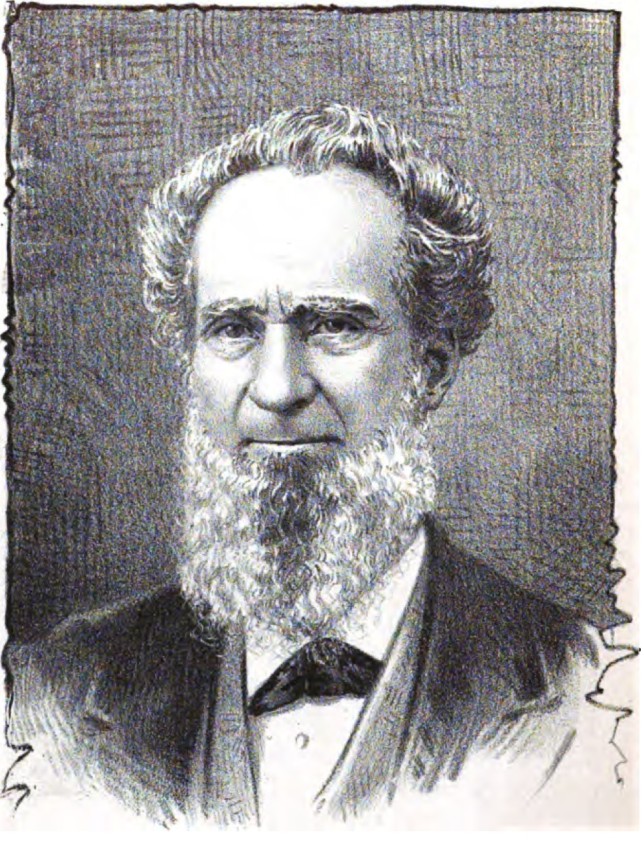
We went to Lowe’s recently, and on the receipt, there was a website listed where you can be entered for a $300 Lowe’s gift card, just by filling out a survey. The survey took about four minutes, but there was one part that really stuck out: you have to enter in your name, address, and phone number in order to be entered into the drawing. It said you must fill out all the information requested in order to be entered.
That word “must” is pretty clear. It means that if you don’t fill out all the information, you lose out on the potential reward. If you fill out some, you aren’t entered. If you fill it out incorrectly, you aren’t entered. There is no wiggle room when they use the word “must.” Pretty much everyone understands that when you use the word “must,” you are saying that it is a requirement, that it is mandatory, that you cannot be or receive what is offered without meeting the conditions stipulated by the word “must.”
The Bible uses this word as well, and it is very important that when God uses the word “must,” His followers pay attention!
Old Testament – Circumcision
The first time the Bible uses the word “must” is in Genesis 17:13. He that is born in thy house, and he that is bought with thy money, must needs be circumcised: and my covenant shall be in your flesh for an everlasting covenant. This is God speaking to Abraham, making a covenant with him that he would be the father of many nations (Genesis 17:5). Notice what God says:
Genesis 17:10-14 – This is my covenant, which ye shall keep, between me and you and thy seed after thee; Every man child among you shall be circumcised. And ye shall circumcise the flesh of your foreskin; and it shall be a token of the covenant betwixt me and you. And he that is eight days old shall be circumcised among you, every man child in your generations, he that is born in the house, or bought with money of any stranger, which is not of thy seed. He that is born in thy house, and he that is bought with thy money, must needs be circumcised: and my covenant shall be in your flesh for an everlasting covenant. And the uncircumcised man child whose flesh of his foreskin is not circumcised, that soul shall be cut off from his people; he hath broken my covenant.
In order to be part of the covenant with God, the descendants of Abraham must needs have been circumcised. The ones who were not circumcised were cut off from the people. In order to be part of this covenant, circumcision was an absolute requirement; it was mandatory; there was no wiggle room or loophole. Being a physical descendant of Abraham wasn’t enough to be in this covenant—circumcision was required—and it was non-negotiable!
Don’t miss the “must” here! People could claim to be in this covenant with God, but if they were not circumcised, they were claiming a falsehood—they were lying! By claiming to be in the covenant with God without circumcision, they were calling God a liar—saying that His requirements weren’t really requirements at all.
Old Testament – The Passover
In Leviticus 23, God gives commands regarding the various feast days that the Israelites are to observe. One of those is the Passover. You’ll remember that God instituted the Passover back in the book of Exodus, to commemorate His passing over the Israelites when He brought the tenth plague on the land of Egypt. But here in Leviticus, God uses the word “must.”
Leviticus 23:4-8 – These are the feasts of the LORD, even holy convocations, which ye shall proclaim in their seasons. In the fourteenth day of the first month at even is the LORD’S Passover. And on the fifteenth day of the same month is the feast of unleavened bread unto the LORD: seven days ye must eat unleavened bread. In the first day ye shall have a holy convocation: ye shall do no servile work therein. But ye shall offer an offering made by fire unto the LORD seven days: in the seventh day is a holy convocation: ye shall do no servile work therein.
When God issues this command to Moses to pass on to the Israelites, He doesn’t give every detail—He doesn’t mention the Passover Lamb, the time in which it is to be killed, the casting out of all leavening from the house—but He does make one thing abundantly clear: they must eat unleavened bread for seven days in order to keep this holy feast.
Don’t miss the “must” here! If they ate leavened bread, they weren’t keeping the holy feast. If they had unleavened bread in the house, but they didn’t eat it, they weren’t keeping the holy feast. People could claim to be keeping the Passover, but if they didn’t eat unleavened bread for seven days, then they were claiming a falsehood; they were profaning God’s divinely-instituted feast.
Somewhere along the way, after this command was passed on from God to Moses to the Israelites, the people had left the proper observance of the Passover—some believe they had forgotten the Passover completely! But after the book of the Law was rediscovered in the days of Josiah, it was observed properly again.
2 Kings 23:21-23 – And the king commanded all the people, saying, Keep the Passover unto the LORD your God, as it is written in the book of this covenant. Surely there was not holden such a Passover from the days of the judges that judged Israel, nor in all the days of the kings of Israel, nor of the kings of Judah; but in the eighteenth year of king Josiah, wherein this Passover was holden to the LORD in Jerusalem.
Other Old Testament Examples
We could also mention how the ones who took the Nazarite vow were told that they “must” keep the vow in a certain way (Numbers 6:1-21, especially verse 21). We could show that Moses had been shown by God that he “must” die without being able to cross into the Promised Land because of his sin (Deuteronomy 4:21-22, 31:14)—which means that if Moses made it across the Jordan River, God was a liar. We could show that the Angel of the LORD told Manoah, “If thou wilt offer a burnt offering, thou must offer it unto the LORD” (Judges 13:16)—which means that God would not accept any burnt offering that was offered to anyone else. We could look at the reaction of the Israelites when Ezra told them they had to make confession to God and put away their strange wives—they said, “As thou hast said, so must we do” (Ezra 10:11-12). They understood that to be right with God, they were required to confess their sin and show their repentance through action—any other response would have been inadequate; they could claim to be following God, but without the confession and repentance, they would have been lying.
Don’t miss the “must”! In each of these examples from the Old Testament, if the person didn’t follow the “must,” they weren’t truly followers of God. They could claim it all they wanted, but they would have been doing nothing more than usurping the title of “children of God,” profaning the commands of God, and implying that God is a liar.
Certainly, the word “must” is important!
But let’s now look at some “musts” from the New Testament.
New Testament – The Sufferings of the Messiah
The Jews, for the most part, had a much different view of the Messiah, the Christ, than God did. They expected a military marvel, a sequel to the victorious David, leading their armies to prominence and their nation to freedom from the Roman Empire. But that’s not how God had it planned.
After hearing the confession of Peter, that Jesus was the Christ, the Son of the living God, and foretelling that He would build His church, the Scriptures say this:
Matthew 16:21 – From that time forth began Jesus to shew unto his disciples, how that he must go unto Jerusalem, and suffer many things of the elders and chief priests and scribes, and be killed, and be raised again the third day.
Mark’s account says that Jesus told them the “Son of man” must suffer those things (Mark 8:31).
After the transfiguration, Jesus answered their question about the Elijah that must come first, and said again that the Son of man must suffer many things and be set at naught (Mark 9:11-13).
The night of Jesus’ betrayal, Peter took out his sword and attempted to protect his Master. But Jesus told him to put away the sword, and said:
Matthew 26:53-54 – Thinkest thou that I cannot now pray to my Father, and he shall presently give me more than twelve legions of angels? But how then shall the scriptures be fulfilled, that thus it must be?
There are other passages that make this same point, but these should suffice. Jesus said unequivocally that He must suffer; He was required to suffer and die.
Don’t miss the “must”! If Jesus did not suffer and die, then He was not the Messiah. If Jesus did not suffer and die (and rise up again on the third day), then He was a usurper of the name “Christ,” He was a liar, He was a blasphemer, and He is someone who should not be followed. However, the evidence shows conclusively that Jesus did suffer, that He did die, and that He was raised from the dead. He said that it must happen, and it did!
New Testament – Born Again
When Nicodemus came to Jesus by night, in John 3, Jesus said to him (starting in verse 3),
“Verily, verily I say unto thee, Except a man be born again, he cannot see the kingdom of God.” Nicodemus saith unto him, “How can a man be born when he is old? Can he enter the second time into his mother’s womb, and be born?” Jesus answered, “Verily, verily, I say unto thee, Except a man be born of water and of the Spirit, he cannot enter into the kingdom of God. That which is born of the flesh is flesh; and that which is born of the Spirit is spirit. Marvel not that I said unto thee, Ye must be born again.”
Notice what is said there—without being born again, you can’t see the kingdom of God; and Jesus equates being born again to being “born of water and spirit” (the word “the” isn’t in the Greek there). Then to make it abundantly clear, the Lord says “You must be born again.”
Don’t miss the “must”! There are people today who claim to be Christians, but who have never been born of water and spirit—they have never been born again! They have simply taken the divinely-given name, claimed it for themselves, all the while never doing that which makes the name valid: being born again. My friends, these people are not Christians! No amount of claiming the name will make it so! They are not part of the kingdom of God, because they haven’t done the thing which Jesus said must be done to be part of it!
The Scriptures define what being “born again” is. Romans 6:3-5 describes the process which culminates in “rising to walk in newness of life”—a new life, a new birth out of the water (John 3:5 literally says “born out of water”) to be free from sin.
Conclusion
When God says “must,” you’d better pay attention! If someone wasn’t circumcised, they were not part of the covenant—no matter what they claimed. If someone didn’t eat unleavened bread, they were not observing the Passover—no matter what they claimed. If Jesus didn’t suffer, die, and rise again, then He wasn’t the Christ—no matter what He might claim. If we are not baptized for the remission of sins, then we are not Christians—no matter what we claim.




